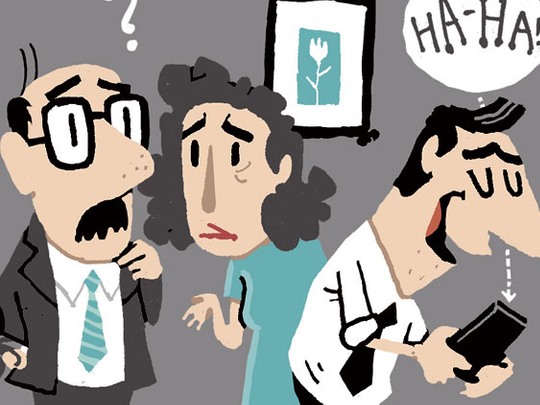
Dubai: It’s always there for you.
It wakes you up, guides you around the city, tells you what your friends and foes are doing, helps you ‘poke’ strangers and even tries to get your most mundane pontifications to #trend.
If the most serious relationship you have ever had is with your smartphone, there are two things you must know right away.
You have a serious problem — and you are not alone.
With all that focus on a tiny screen in the palm of your hand, who has the time for face-to-face interaction?
According to Phil Reed, professor of psychology at UK-based Swansea University and an expert on internet addiction, it is a question that is causing a global personality shift.
He told Gulf News: “Phubbing (or phone snubbing) is not a disorder, but it concerns interrupting a real social interaction in favour of a virtual one.”
In a study from the New York-based McCann, which surveyed 9,000 people, 30 per cent of global consumers picked an image of two friends to describe their relationship with their smartphone while 18 per cent classified it as a very intense relationship, mirroring that of two lovers.
Users spend more time on their phones browsing the internet (25 minutes a day) and social networking (17 minutes a day) than making calls (12 minutes), according to a report by UK-based mobile network O2.
Smartphone addiction is a common phenomenon in the Middle East, too.
The UAE has one of the world’s highest mobile penetration rates at over 230 per cent. Almost half of the Middle East’s 77 million internet users prefer to go online from their mobile devices, and 71 per cent of residents admit that they are addicted to their phones, according to a study by dmg events Middle East.
The habit is common in the tech-savvy 16 to 35 age group, as they are always plugged in.
In a research paper published by the US Public Library of Science, Reed and his colleagues found excessive internet usage “may be escape-maintained and self-fuelling – engagement in the behaviour lowers mood, which then triggers further engagement to escape from the low mood”.
They also discovered that internet addiction was strongly related to autistic traits, such as preference for social isolation and limited face-to-face interaction.
Long-term internet use has been known to produce micro changes in brain structure. Reed said one study demonstrated there was 10 to 20 per cent shrinkage in the surface area of the brain in users who had used it excessively for over a year.
Reed said: “People are beginning to use the internet between 12 to 14 hours a day, to the extent that it’s actually damaging the rest of their lives… their social relationships deteriorate and they find it difficult to do anything else.”
It’s no wonder that nine out of every 10 people aged under 30 admit to suffering from ‘nomophobia’, the fear of having no mobile phone, according to a 2011 survey by international telecom company Cisco.
Over half of respondents in a 2013 Performics Mena (Middle East and North Africa) survey said they felt more comfortable with virtual conversations than real-time ones. The respondents were based in Egypt, UAE and Saudi Arabia.
Regardless of which part of the globe they reside in, smartphone addicts share a few behavioural attributes.
Reed said: “Social isolation, leading to inexperience and poor understanding of social etiquette, depression and in some extreme cases, a need for exerting control over a situation, all contribute to phubbing.”
The McCann survey found that five in ten people thought it is more tempting to be rude to others when using a mobile device. Over 60 per cent of respondents believed that what they do on their mobile device has no effect on people around them.
Reed said: “Phubbers often have impulse-control problems. They may be distracted easily, or seek what they think is the more immediate reward of a quick phone call or an e-mail or a Facebook ‘poke’.”
The 2013 Mobile Consumer Habits study found that three in four smartphone users in the US were within five feet of their phones almost all the time. However, with a little effort, smartphone addicts can break free.
There are support groups for recovering internet addicts, such as the US-based Centre for Online and Internet Addiction and Internet and Tech Addiction Anonymous.
Reed shared advice for those trying to break the cycle of dependence: “Turn off the mobile phone, turn off the apps, and seek other forms of reinforcement – doing these things will actually reduce your stress, and increase your positive mood, over time.”







